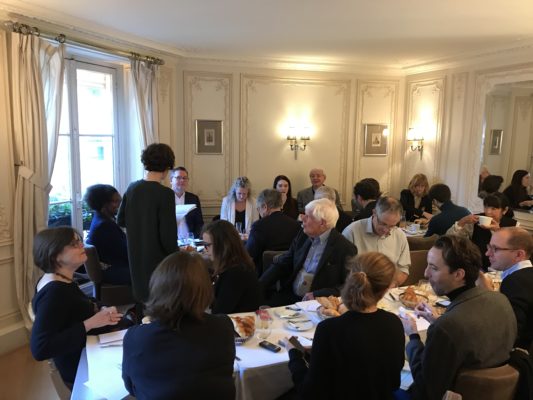In a 90 minute group interview, Ndiaye discussed her attachment to France, her relationship with President Emmanuel Macron, how the crisis of the Gilets Jaunes has changed his policies, Franco-American relations, sectarianism in France, the reasons behind the strike scheduled for December 5th, pension reform, the accusation of rape against film director Roman Polanski, racism against herself, the issue of returning jihadis and the difficulty of providing housing for migrants.
Ndiaye said she decided to become a French citizen in 2016, after the death of her mother. Her parents had met in Paris when both were militant Communist students, campaigning for African independence. “Senegal and France have always been inter-mingled in my personal story. There has always been a part of me that was French,” she said.
Ndiaye first met Emmanuel Macron when he was deputy secretary general of the Élysée. “He was always very approachable, welcoming and cordial with the people around him,” she said. Their relationship was a professional one, based on great respect. She came to know him better from travelling with him on trains and planes during the 2017 presidential campaign.
 “He is a stubborn, committed person,” Ndiaye said of Macron. “He is someone who doesn’t like the established order, the idea that it’s always been done like that. The idea that it’s been that way for a very long time is totally foreign to him.”
“He is a stubborn, committed person,” Ndiaye said of Macron. “He is someone who doesn’t like the established order, the idea that it’s always been done like that. The idea that it’s been that way for a very long time is totally foreign to him.”
The Gilets Jaunes crisis revealed “the difficulty for a part of our country to feel fully integrated in globalisation,” Ndiaye said. Macron had realised that he could not reform “for the French in their name” but had to reform with the French. He seeks greater proximity with his compatriots during the second half of his term.
The US and France “have divergent visions of the world,” Ndiaye said. “We say frankly that we can disagree with the US government, for example regarding trade and more broadly on the question of multilateralism.”
Regarding sectarianism, Ndiaye said, “France is a nation built on the idea of the citizen belonging first of all to the national community, before being black or white, before being Jewish, Muslim, Catholic or any other identity.”
Asked to explain the mobilisation for strikes and demonstrations on December 5th, Ndiaye spoke of the “great suffering of professional categories” including hospital workers and farmers. She said pension reform is a source of disquiet for all French people. Confidence has been destroyed by the fact that governments have attempted pension reforms every five years for the past 20 years. “There are obviously categories who have legtimate worries,” she said. The government is “holding out its hand to all” and “all options are on the table.”
Ndiaye said she would not go to see Polanski’s new film about the Dreyfus Affair because of recent accusations against him, but she did not call for a boycott because there must be an investigation by the French justice system.
Social media continue to convey racist remarks about her, Ndiaye said. She paid tribute to three French politicians who “didn’t necessarily notice that I was a woman, nor that I was black,” when she worked for them: Claude Bartolone, Arnaud Montebourg and Emmanuel Macron. It registered with Macron that she was black the day security guards and police prevented her following him at the aeronautics show at Le Bourget, because they weren’t used to seeing a black person in the entourage of a cabinet minister.
Ndiaye said more than 250 jihadists have travelled from Turkey to France since 2014. It was better for French citizens who joined Islamic State to be put on trial in the region where they may have committed crimes, she said. The the issue is being dealt with on a case by case basis. Children of French jihadists could not be separated from their mothers.
Wasn’t it shameful for France to leave thousands of migrants living rough or in tents? Ndiaye was asked. She said the government had “gone to considerable effort to build welcome centres”. Fifteen thousand places had been “unblocked” in low income housing in the last 18 months, creating tension with French people on waiting lists. The government will find another 16,000 places in 2020, she said. An asylum application usually takes 18 months to be considered, but the government tries to examine the applications of people who it knows will be rejected first, Ndiaye said